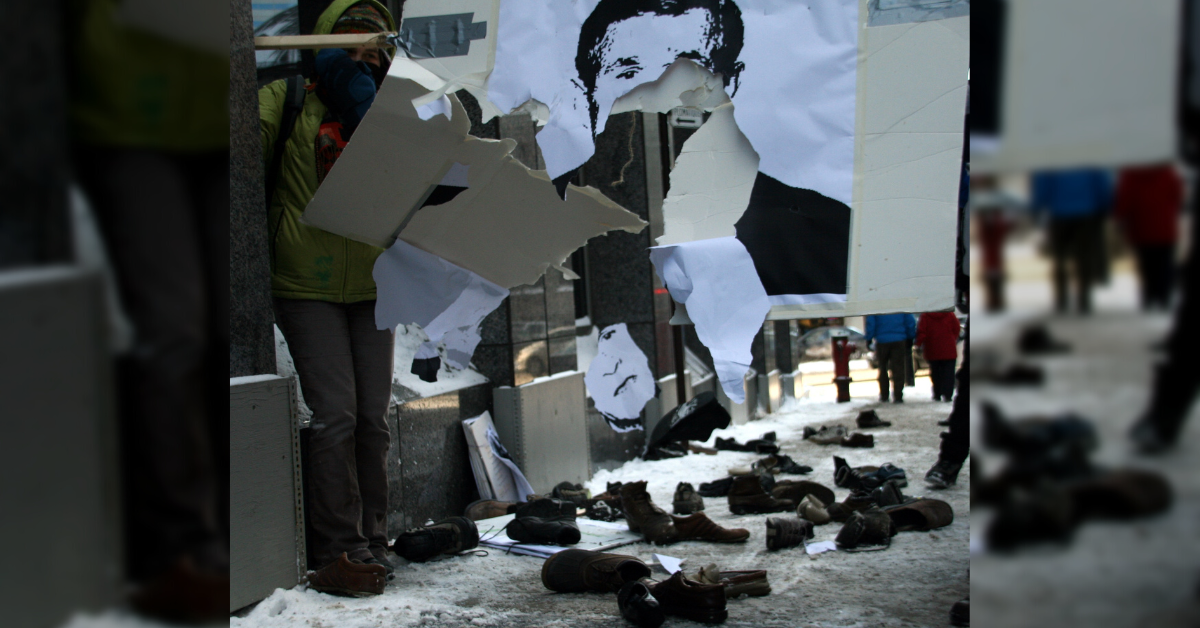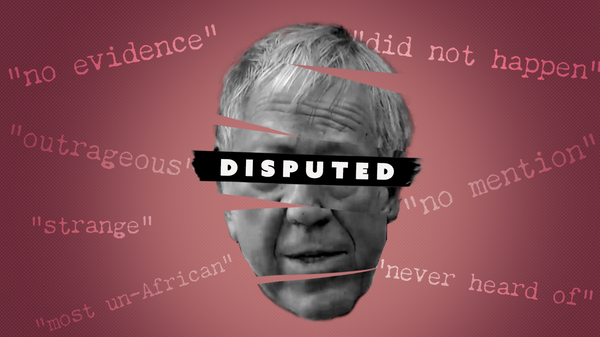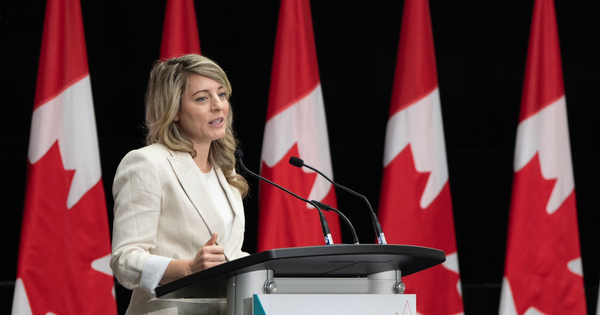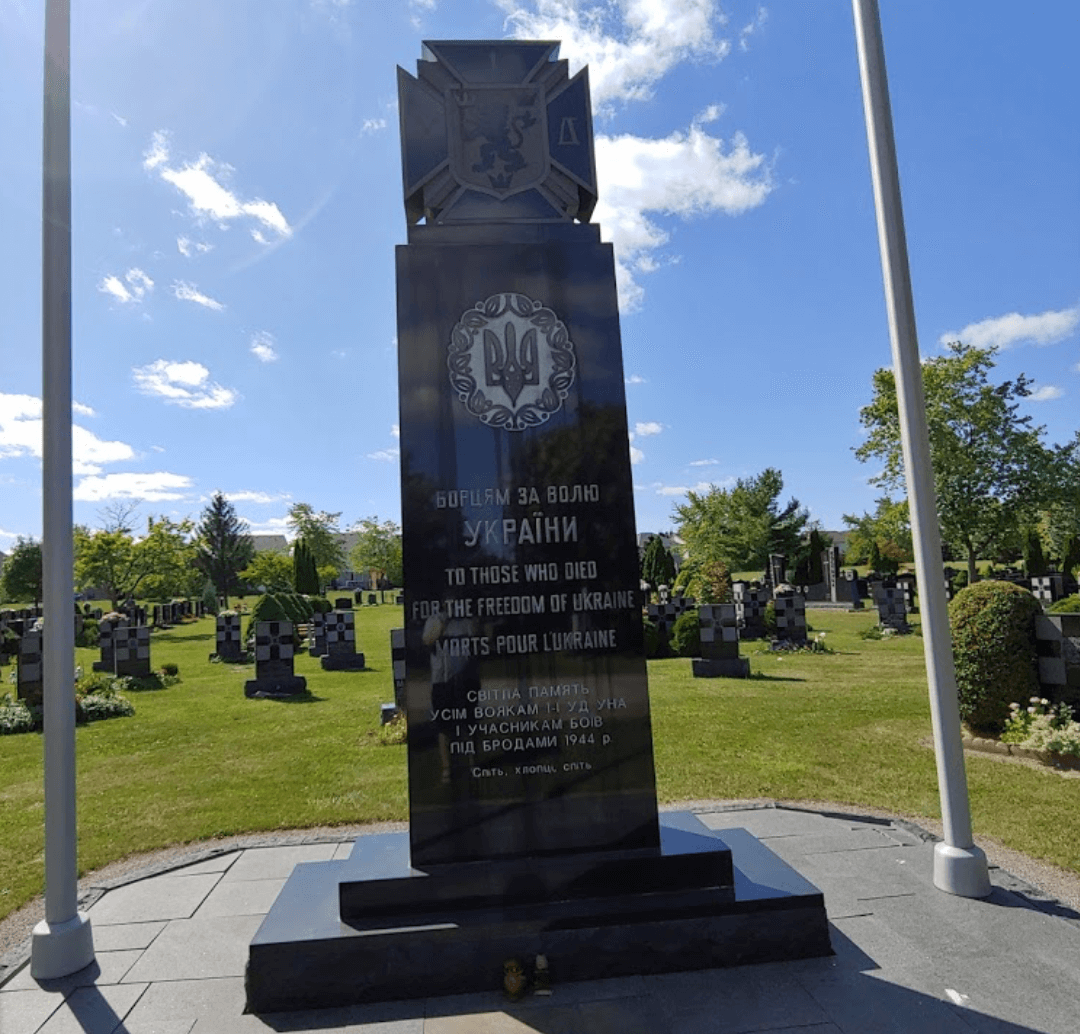On March 19, 2003, almost 20 years ago today, the United States launched its war against Iraq. In the years that followed, more than 288,000 Iraqis were killed, including between 186,000 and 210,000 civilians, according to Iraq Body Count. The war left the country in ruins. It also helped spark a new wave of terrorism as well as the foundation of the Islamic State, which would wreak havoc upon the region. In all, the war was a catastrophe.
The war in Iraq met mass opposition within many countries even before it began, with millions of people eventually taking to the streets to call for peace. These protesters predicted from the start that the war would be a disaster. Unfortunately, their voices were largely ignored by their governments and much of the media establishment. In fact, in Canadian media, nearly every publication supported the war wholeheartedly in the leadup to the invasion. This came in the form of official editorial endorsements, as well as publishing a range of individuals making the case for war.
Media support for this war must never be forgotten. Those who wrote in support of it should, at the very least, feel shame for the rest of their lives. Instead, many of these voices continue on in the industry proudly declaring their support for the next proposed war or regime change operation against the ‘evil dictator’ of the day.
Here’s a roundup of some Canadian columnists and editorial boards that supported the Iraq war in March 2003. Don’t let them forget it.
If you’d like to see what stances Canadian media outlets have taken toward wars Canada has been involved in, you can read an article I published in 2021.
Editorial Boards
On March 11, the Canwest media chain published an editorial calling for war at many of its publications, including the National Post, Ottawa Citizen, Windsor Star, Times Colonist, Saskatoon Star Phoenix, Regina Leader-Post, Montreal Gazette, Edmonton Journal, Vancouver Sun and Calgary Herald. The title of the editorial varied between publications, but for most of them it was “Canada must stand and be counted: No further hand-wringing debate is necessary.”
The editorial states: “War is never desirable, but sometimes necessary. It is necessary now. The indictment against the Iraqi regime has been proven over and over. When war comes, and ends, it is essential that Canada will have stood unequivocally with the coalition of the willing, and been counted as a reliable friend to Britain and the United States. The world faces a competition between the self-interests of [Iraqi President Saddam Hussein] and his French and German friends, and British and American- led interests seeking to enforce international law; eradicate state- sponsored terrorism and weapons proliferation; rescue the Iraqi people from a brutal dictator and vest them with freedom; and create a legitimate Iraqi partner in the quest for peace in the Middle East. The choice for Canada is clear.”
The editorial adds: “It is France that is truly motivated by oil politics, and Germany that is motivated by economics, not the U.S.”
On March 18, the National Post published an editorial titled “On to war,” making a broad case for the invasion and mocking its opponents and even those concerned about its consequences.
The editorial board claims that the “moral and legal justifications for war are clear enough,” takes as a fact that Iraq had “weapons of mass destruction” and states Hussein would “rather die than give those programs up.”
Regarding the specifics of the invasion, the board writes that “the United States and Britain must walk a fine line, ensuring that enough force is used to ensure the war is short, yet not so much that innocent civilians are put unnecessarily at risk.”
They add: “The march to Baghdad must be swift. From the start, the U.S.-led coalition must knock out Iraq’s command and control centres, and its power, water and resupply systems. It must secure Iraq’s oilfields, not to secure post-war profits, but to ensure the pumps and refineries are not ignited — smoke and heat play havoc with high- tech weaponry. It must […] eliminate all WMDs, missiles and drones, and, of course, kill or capture Saddam and his key advisors.”
They then proclaim that, “Accomplishing all of this, while at the same time minimizing civilians [sic] casualties and making provision for the ready comfort of millions of innocent Iraqis, will be a massive task. But the United States has the technology and manpower to accomplish it.”
Of course, many thought the U.S. did not have the will nor desire to minimize civilian casualties, and perhaps would go out of its way in at least some cases to kill them. The Post responded as such: “Some civilian casualties are inevitable — and Europe’s anti-war media will no doubt let loose with a barrage of horror stories trumping up U.S. ‘war crimes’ and warning of an eruption of the ‘Arab street.’ (They pulled the same trick when Israel invaded the West Bank last year.) The sight of jubilant Iraqis welcoming U.S. tanks will dull this propaganda onslaught. But until then, Canada must stand by its friend and ally in every way it can.”
Iraqis didn’t welcome the U.S. Concerns about mass atrocities weren’t propaganda, and in fact came true. The only prescient position taken by the Post here is acknowledging that Canada’s media would be largely pro-war.
On March 19, The Globe and Mail published an editorial titled “Canada’s Iraq policy: Inconsistency ho!” In it, they admonished Prime Minister Jean Chrétien for refusing to officially join the pending invasion, outright calling it the “wrong choice” and adding that it was an “unfortunate decision” made through “pretzel logic.”
The Globe wrote, “Ottawa wholeheartedly endorsed United Nations Security Council Resolution 1441 last fall, which gave Saddam Hussein a last chance to eliminate all weapons of mass destruction. The Liberal government has pulled back just as the military consequences of Mr. Hussein’s failure to abide by the resolution seem about to commence.”
Of course, no weapons of mass destruction were ever found. They didn’t exist, and served as a very flimsy pretext for the invasion (one that the media helped grant legitimacy to).
There was one major exception to this trend in Canadian media: the Toronto Star. On March 18, they published an editorial titled “Canada is right to say No to war,” arguing, “This war is morally wrong, ill timed and of dubious legality. Criminal as Saddam’s regime is, and deserving of containment, it poses no real threat to the U.S. or anyone else.”
They added, “Indeed, Chretien should have gone a step further [than deciding not to officially take part in the invasion] by ordering any Canadian troops not specifically earmarked for the war on terrorism or our role in Afghanistan to leave the region.” (The Star did support the war in Afghanistan.)
Columnists
Andrew Coyne, then a columnist at the National Post and now a columnist at The Globe and Mail, wrote an article for the Post published on March 7 titled, “12 arguments against war, rebutted.”
Responding to the claim that no proof had been offered that Iraq possessed WMDs, Coyne wrote, “Iraq confessed to producing and storing massive stockpiles of chemical and biological weapons, though not until high- level defectors ratted them out. It has never, in 12 years, produced a scrap of evidence to suggest it has destroyed them.”
Responding to the claim that the invasion would pose major risks, Coyne wrote, “Anyone can come up with a list of disasters that might conceivably arise, from any action. But until you attach some probability to these, they are of little guidance. It is not at all clear that the region would be destabilized by a quick and decisive war, or that the liberation of Iraq’s 20 million Islamic citizens would inspire Muslim resentment, or that terrorists need an excuse to attack.”
And responding to concerns about the possibility of hundreds of thousands of civilian deaths, Coyne outright states: “There is no basis to these forecasts.”
Jonathan Kay, then an editor of National Post’s editorials section and now a Quillette editor, wrote an article for the paper published on March 12 titled, “Talking about a revolution.”
Kay takes the position that the invasion is justifiable as long as the Americans commit to sticking around and playing “the role of policeman and nation-builder for many years.”
Kay describes Bush as having a “revolutionary spirit,” and offers two predictions: “First, the invasion will be a speedy rout punctuated by a handful of horrible, deadly engagements with scattered groups of Iraqi diehards. And second: When Iraqis shower U.S. tanks with flowers and Saddam is murdered by his own men, there will be a chorus of hawks shouting ‘I told you so.’” Kay adds, “But not me. While Saddam deserves the fate awaiting him, draining the Arab Middle East’s stagnant socio-political swamp is the real prize.”
Marcus Gee, who was a columnist then and also now for The Globe and Mail, wrote an article for the paper published on March 17 titled, “Time to unite to vanquish Hussein.”
Gee calls on the United Nations to give its stamp of approval to the soon-to-be-launched U.S.-led invasion of Iraq, writing, “Terrorism still holds a knife at the world’s throat. North Korea and now Iran are striving to acquire nuclear weapons. If these threats come together — terrorism on the one hand, weapons of mass destruction on the other — the results are unimaginable. The barbarians are at the gate. If we hope to repel them, the civilized nations of the world must stand together.”
Margaret Wente, then a columnist at The Globe and Mail and now retired, wrote an article for the Globe published on March 20 titled, “So long, Saddam! You’re toast.”
She starts off the article by writing, “His 48 hours are up. His 12 years of miraculous reprieves are up. His 30 years of monstrous tyranny are up. Saddam Hussein will be gone in days or weeks, and the prospect fills my heart with gladness. Bring on the war and get him, fast.”
Throughout the article, Wente excoriates the government for not officially joining the invasion of Iraq, claiming it was a mistake that would bring shame. Wente writes, “I don’t know what will happen to Iraq after the war. But it’s hard to imagine that life won’t improve. Not a single person in the world will mourn Saddam’s passing […] Your time’s up, Saddam. History will judge you for exactly what you are. As for how history judges Canada — well, I’m ashamed to think about that.”
Christie Blatchford, then a columnist at the National Post and now dead, wrote an article for the Post published on March 27 titled, “All we had to do was be a good friend.”
Blatchford claims the fact that Bush didn’t mention Canada in a speech thanking allies for their contribution to the war was “stark and awful.” She goes on to write, “Canada never had to send soldiers, you see. Canada never had to become a slavering warmonger to maintain her neighbour’s respect and affection. Canada never had to drop bombs on innocent Iraqi children, as goes the cant of the Left despite abundant evidence that coalition forces are doing — imperfectly, alas, as is inevitable — everything they can, including taking more casualties themselves, to avoid doing just that. To be deemed a reasonable ally, Canada only ever had to offer moral support and to do a little something that was do-able within the bounds of her own political realities.”
Blatchford goes on to add: “Canada failed to meet even this modest test. To put it in Don Cherry terms, Canada did not have to grab a chair and crack it over the head of the guy her American pal was pummelling in the bar, she had only to refrain from actively cheering the other fellow on — oh, and maybe buy the Yank a drink when the mess was over.”








Member discussion